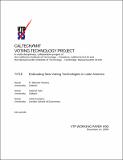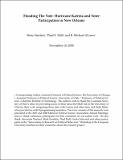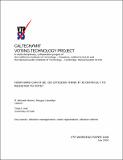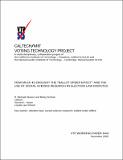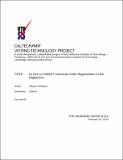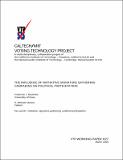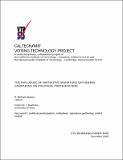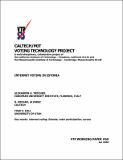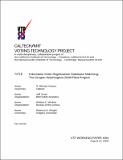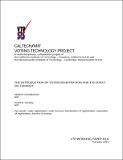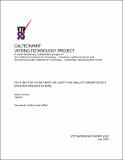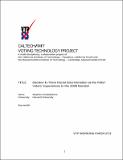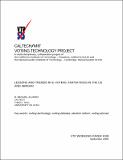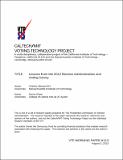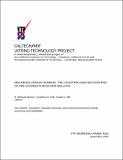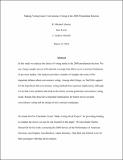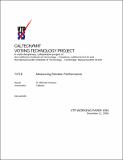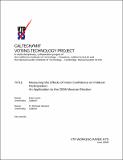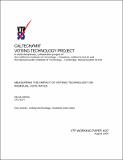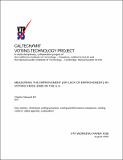Browsing Publications and Working Papers by Title
Now showing items 34-53 of 123
-
Evaluating New Voting Technologies in Latin America
(Caltech/MIT Voting Technology Project, 2009-12-14)Having remained virtually unchanged since the enactment of universal and secret suffrage at the end of the nineteenth century, voting procedures are undergoing a radical transformation in many countries through the ... -
Flooding The Vote: Hurricane Katrina and Voter Participation in New Orleans
(Caltech/MIT Voting Technology Project, 2008-11-10)The flooding of New Orleans from Hurricane Katrina resulted in a massive and rapid exodus of individuals from New Orleans to locations around the United States. In the midst of the hurricane recovery, the City of New Orleans ... -
How Hard Can It Be: Do Citizens Think It Is Difficult to Register to Vote?
(Caltech/MIT Voting Technology Project, 2006-07)Political equality is seen as an intrinsic normative principle for the adequate functioning of a democratic republic. However, it is well documented that in the United States there are many qualified citizens who do not ... -
How Much is Enough? The "Ballot Order Effect" and the use of Social Science Research in Election Law Disputes
(Caltech/MIT Voting Technology Project, 2005-11)Previous empirical research and other related research from survey methodology holds that candidates listed first on an election ballot may gain some measure of advantage from this ballot placement. Using data from the 1998 ... -
In Line or Online? American Voter Registration in the Digital Era
(Caltech/MIT Voting Technology Project, 2014-02-18)Online voter registration is one of the most recent efforts to stimulate turnout in American elections. Within the past decade, an increasing number of states have begun to allow their residents to register as voters ... -
The Influence of Initiative Signature Gathering Campaigns on Political Participation
(Caltech/MIT Voting Technology Project, 2005-03-21)Does direct democracy increase political participation? Rather than focus on state-level effects of the initiative process, this paper studies the effect of signature gathering campaigns on participation within a state. ... -
The Influence of Initiative Signature Gathering Campaigns on Political Participation (II)
(Caltech/MIT Voting Technology Project, 2005-12-12)Does direct democracy increase political participation? Rather than focus on state-level effects of the initiative process, this paper studies the effect of signature gathering campaigns on participation within a state. ... -
Internet Voting in Estonia
(Caltech/MIT Voting Technology Project, 2008-01)Several countries have conducted Internet voting trials in binding public elections over the past decade, including Switzerland, the United Kingdom, and the United States. These trials have been conducted at the local and ... -
Interstate Voter Registration Database Matching: The Oregon-Washington 2008 Pilot Project
(Caltech/MIT Voting Technology Project, 2009-08-10)Voter registration databases maintain lists of registered voters that are used to determine who is and is not eligible to vote in an election. As such, accurate voter registration databases form a cornerstone of the electoral ... -
The Introduction of Voter Registration and Its Effect on Turnout
(Caltech/MIT Voting Technology Project, 2004-02)Voter registration, it is widely argued, raises the costs of voting, thereby decreasing turnout. Studies of turnout across states find that states with later registration dates or election day registration have much higher ... -
Is It Better to be First or Last? The Ballot Order Effect
(Caltech/MIT Voting Technology Project, 2005-07) -
Is There Racial Discrimination at the Polls? Voters' Experience in the 2008 Election
(Caltech/MIT Voting Technology Project, 2009-03)In 1965, the United States Congress enacted the Voting Rights Act to end discrimination against black voters at the polls in Southern states and throughout the nation. The Act prohibited the use of “tests” and other devices ... -
Lessons and Trends in E-Voting: Initiatives in the U.S. and Abroad
(Caltech/MIT Voting Technology Project, 2005-09-01)Since the 2000 election, there has been a debate over the role of voting technology in the election process. In 2000 and 2001, this debate focused on the deficiencies associated with paper ballots—especially the punch ... -
Lessons from the 2012 Election Administration and Voting Survey
(Caltech/MIT Voting Technology Project, 2013-08-03)Since our country’s inception, collecting appropriate data on elections and the administration of elections has been somewhat problematic, due to the fact that multiple levels of government are involved in running elections ... -
Machines Versus Humans: The Counting and Recounting of Pre-Scored Punchcard Ballots
(Caltech/MIT Voting Technology Project, 2005-09-20)The counting of ballots, especially punchcard ballots, has received a great deal of attention in the years following the 2000 presidential election in Florida. Much of the research literature has focused on various measures ... -
Making Voting Easier: Convenience Voting in the 2008 Presidential Election
(Caltech/MIT Voting Technology Project, 2010-03-15)In this study we analyze the choice of voting mode in the 2008 presidential election. We use a large-sample survey with national coverage that allows us to overcome limitations of previous studies. Our analysis provides a ... -
Measuring Election Performance
(Caltech/MIT Voting Technology Project, 2009-12-11)The 2000 presidential election was one of the closest elections in American history. A margin of about 550,000 votes separated Al Gore from George Bush, only about 0.52% of votes cast. And despite the fact that Gore received ... -
Measuring the Effects of Voter Confidence on Political Participation: An Application to the 2006 Mexican Election
(Caltech/MIT Voting Technology Project, 2009-06-20)In this paper we study the causal effect of voter confidence on participation decisions in the 2006 Mexican Election. Previous research has shown that voter confidence was a relevant factor in explaining participation ... -
Measuring the Impact of Voting Technology on Residual Vote Rates
(Caltech/MIT Voting Technology Project, 2005-08)In the wake of the 2000 election, the importance of knowing the impact of voting equipment on the number of uncounted ballots became evident. Using data from the 1988-2004 presidential elections, this paper estimates the ... -
Measuring the Improvement (Or Lack of Improvement) in Voting Since 2000 in the U.S.
(Caltech/MIT Voting Technology Project, 2005-09-04)This paper summarizes what systematic evidence exists about the performance of the American voting process in 2004 and proposes a comprehensive system of performance measures that would allow citizens and officials to ...

